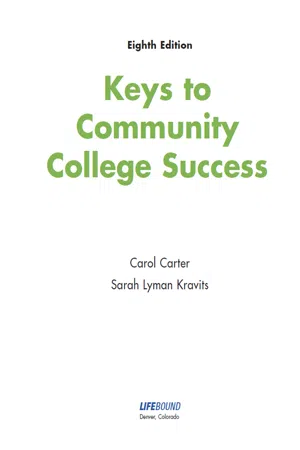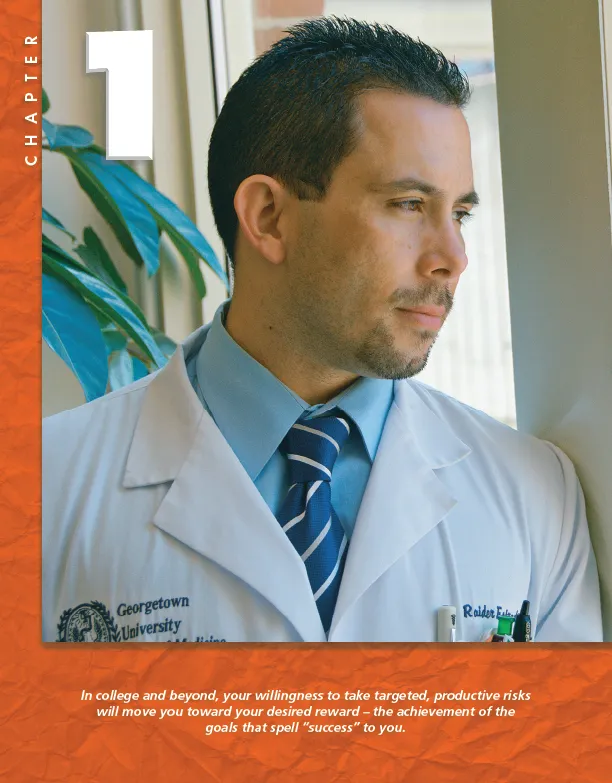
Keys to Community College Success
COVID-19 Success Updates and Coaching Included
- 346 pages
- English
- ePUB (mobile friendly)
- Available on iOS & Android
Keys to Community College Success
COVID-19 Success Updates and Coaching Included
About this book
For First Year Experience, Student Success, and Introduction to College courses for students attending two year programs. Keys to Community College Success sets the standard for connecting academic success to success beyond school, showing students how to apply strategies within college, career, and life. This Eighth edition retains Keys ' tried-and-true emphasis on thinking skills and problem solving, re-imagined with two goals in mind: One, a risk and reward framework that reflects the demands today's students face, and two, a focus on student experience specific to two-year schools with a more extensive research base and increased metacognition, helping students get a degree, get skills, or work toward a transfer. Keys to Community College Success helps students take ownership, develop academic and transferable skills, and show the results of commitment and action so they are well equipped with the concentration, commitment, focus, and persistence necessary to succeed. Keys to Community College Success provides the established KEYS set of tools for success —an understanding of how coursework connects to career and life goal achievement, and analytical, creative, and practical thinking coverage that empowers a range of cognitive ability. This content provides:
- COVID-19 Update: College students in 2020 need relevant information during the unprecedented time of COVID-19. This update of Keys to Community College Success includes up-to-the minute information on digital and distributed learning strategies and practical tips on resilience, persistence, purpose, and strength.
- College Connection to Career and Life Goals: Infused with a focus on risk and reward, showing that the reward of success in the modern world demands a risk of vision and persistent effort over time. It raises the bar to show students that they must risk action to grow, thrive, and contribute in order to make their college investment pay off in gainful employment, meaningful work, and community involvement.
- Thinking Skills coverage: Comprehensive content with research references lend credibility and perspective to concepts, targeted exercises that explore personally relevant situations in context, and sustained focus throughout each topic.
- Tailored to the Two Year Program experience: Acknowledges global economic change and instability and hones in on student concerns about employability skills and debt management so the two-year college experience is framed in practical, work-relevant ways with consideration toward transfer students as well. New coverage of resources, topics, and research support concepts.
Frequently asked questions
- Essential is ideal for learners and professionals who enjoy exploring a wide range of subjects. Access the Essential Library with 800,000+ trusted titles and best-sellers across business, personal growth, and the humanities. Includes unlimited reading time and Standard Read Aloud voice.
- Complete: Perfect for advanced learners and researchers needing full, unrestricted access. Unlock 1.4M+ books across hundreds of subjects, including academic and specialized titles. The Complete Plan also includes advanced features like Premium Read Aloud and Research Assistant.
Please note we cannot support devices running on iOS 13 and Android 7 or earlier. Learn more about using the app.
Information

The Rewards of College




WHY IS COLLEGE A RISK, AND
The Culture of College
Table of contents
- Cover
- Title Page
- Copyright
- About the Authors
- Brief Contents
- Preface
- Update: College During the COVID-19 Pandemic
- Quick Start to College
- Chapter 1 The Rewards of College: Taking Risks that Move You toward Success
- Chapter 2 Values, Goals, and Time: Managing Yourself
- Chapter 3 Learning How You Learn: Making the Most of Your Abilities
- Chapter 4 Critical, Creative, and Practical Thinking: Solving Problems and Making Decisions
- Chapter 5 Reading and Information Literacy: Learning from Print and Online Materials
- Chapter 6 Listening and Note Taking: Taking In and Recording Information
- Chapter 7 Memory and Studying: Retaining What You Learn
- Chapter 8 Test Taking: Showing What You Know
- Chapter 9 Diversity and Communication: Making Relationships Work
- Chapter 10 Wellness and Stress Management: Staying Healthy in Mind and Body
- Chapter 11 Managing Money: Living Below Your Means
- Chapter 12 Careers and More: Building a Successful Future
- Appendix A: The Writing Process
- Appendix B: Social Networking and Media
- Endnotes
- Index